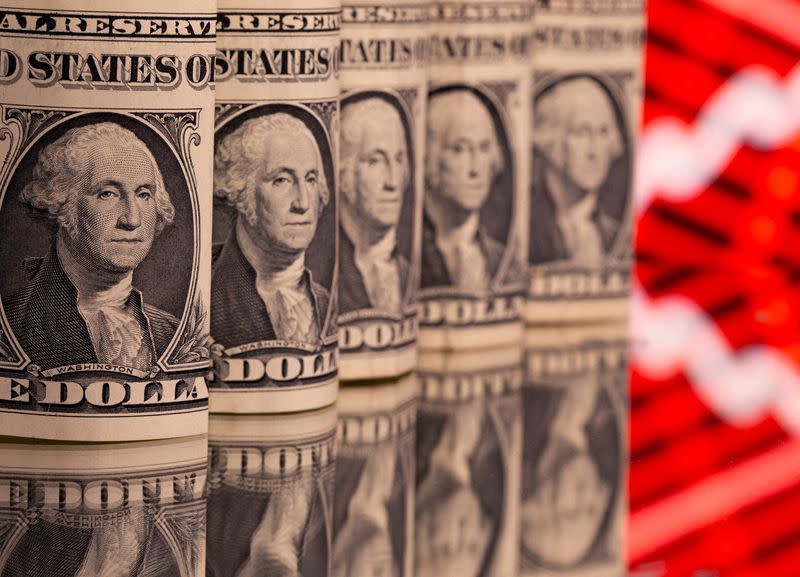Stocks dip but up for the week, US dollar climbs

By Chuck Mikolajczak and Isla Binnie
NEW YORK (Reuters) -A gauge of global stocks declined for a second straight session on Friday, weighed down by weakness in technology shares, while the dollar hit its highest level since early May as a gauge of U.S. business activity edged up to a more than two-year high.
S&P Global said its flash U.S. Composite PMI Output Index, which tracks the manufacturing and services sectors, inched up to 54.6 this month, the highest since April 2022, from a 54.5 reading in May. A reading above 50 indicates expansion.
However, while a rebound in employment helped lift the reading, price pressures eased, adding to recent data that has boosted optimism that inflation may be cooling.
On Wall Street, the S&P 500 and Nasdaq finished slightly lower as Nvidia shares fell more than 3% as the biggest drag on both indexes and sending the tech sector lower.
Despite the decline, the chipmaker remains up about 155% on the year as an intense rally in AI-related stocks has lifted both indexes to multiple record highs in recent days.
"We've had a very strong run, especially in the S&P over the last couple weeks. So not surprised to see things kind of take a pause and settle down,” said Zachary Hill, head of portfolio management at Horizon Investments in Charlotte, North Carolina.
The Dow Industrials managed to eke out a small gain, in part driven by a climb in McDonald's shares. The Dow ended the week up 1.44%, its biggest weekly percentage gain since mid-May. The S&P rose 0.61% for its third straight weekly advance. The Nasdaq rose only 0.003% on the week, its third straight weekly advance.
The Dow Jones Industrial Average rose 15.57 points, or 0.04%, to 39,150.33, the S&P 500 lost 8.55 points, or 0.16%, to 5,464.62 and the Nasdaq Composite lost 32.23 points, or 0.18%, to 17,689.36.
MSCI's gauge of stocks across the globe fell 2.98 points, or 0.37%, to 801.37 after touching an intraday record of 807.17 on Thursday but was still on track for a third straight week of gains.
Other economic data on the housing market showed U.S. existing home sales fell for a third straight month in May as record-high prices and a resurgence in mortgage rates kept potential buyers on the sidelines.
European stocks closed lower, pressured by falls in bank stocks and technology shares against a backdrop of economic data showing euro zone business growth slowed sharply this month.
The STOXX 600 index fell 0.73%, while Europe's broad FTSEurofirst 300 fell 15.59 points, or 0.76%.
U.S. Treasury yields briefly inched higher after the data but were largely little changed on the session, with the yield on benchmark U.S. 10-year notes 0.1 basis point higher at 4.255%. The 10-year yield was set for its first weekly climb after two straight declines.
The dollar index, which measures the greenback against a basket of major currencies, gained 0.17% to 105.81, with the euro down 0.09% at $1.069.
Sterling slightly weakened 0.05% to $1.2649.
Against the Japanese yen, the dollar strengthened 0.43% to 159.59. That level had not been seen since late April when Japanese authorities intervened to halt the rapid fall in the currency.
Japanese data earlier on Friday indicated the country's demand-led inflation slowed in May, clouding the picture for a rate hike from the Bank of Japan.
Bank of Japan Deputy Governor Shinichi Uchida said on Friday the central bank was willing to raise rates if the economy and prices move in line with its forecasts, but signs of weakness remained.
In commodities, the stronger dollar helped send oil prices lower, with U.S. crude settling down 0.69% at $80.73 a barrel and Brent off 0.55% on the day to settle at $85.24 per barrel. Both crude benchmarks finished up about 3% on the week, however.
(Reporting by Chuck Mikolajczak in New YorkAdditional reporting by Lisa Mattackal and Ankika Biswas in Bengaluru and Echo Wang in New YorkEditing by Nick Zieminski, Cynthia Osterman and Matthew Lewis)

 Yahoo Finance
Yahoo Finance 